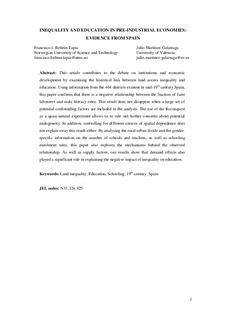Inequality and education in pre-industrial economies: Evidence from Spain
Journal article, Peer reviewed
Accepted version
Permanent lenke
http://hdl.handle.net/11250/2592663Utgivelsesdato
2018Metadata
Vis full innførselSamlinger
Originalversjon
Explorations in economic history (Print). 2018, 69 81-101. 10.1016/j.eeh.2017.12.003Sammendrag
This article contributes to the debate on institutions and economic development by examining the historical link between land access inequality and education. Using information from the 464 districts existent in mid-19th century Spain, this paper confirms that there is a negative relationship between the fraction of farm labourers and male literacy rates. This result does not disappear when a large set of potential confounding factors are included in the analysis. The use of the Reconquest as a quasi-natural experiment allows us to rule out further concerns about potential endogeneity. In addition, controlling for different sources of spatial dependence does not explain away this result either. By analysing the rural–urban divide and the gender-specific information on the number of schools and teachers, as well as schooling enrolment rates, this paper also explores the mechanisms behind the observed relationship. As well as supply factors, our results show that demand effects also played a significant role in explaining the negative impact of inequality on education.

